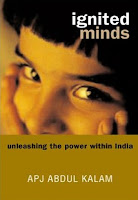Book Review : Ignited Minds by A. P. J. Abdul Kalam (Rating ****)
Genius, it is said, is the ability to reduce the complex into the
simple. The strength of Ignited Minds, A.P.J. Abdul Kalam's latest essay
at book-writing, lies in the scientist's ability to present some of the
most tangled issues that confront the nation in easily digestible
packages of information.
Kalam throws modesty to the winds and makes bold to present his "I have a dream" kind of vision statement to pull the nation out of the morass of doubt that it has fallen into. But those looking for an erudite discourse on the nation's woes by someone who has achieved so much may feel let down. Kalam's world-view is at times far too simplistic, even bordering on the naive.
Yet it is precisely the lack of cynicism that makes it a refreshing read especially for the young reader. Kalam's "Can Do" approach even at his age is a lesson for all those who curl their lips at any talk of India achieving greatness in the near future.
The scientist is right to rely on the young to ask him some of the most stimulating questions. A student in Assam, for instance, asks him pertinently why the flood waters of the Brahmaputra cannot be diverted to water-scarce Rajasthan and Tamil Nadu? Dulled, even deadened, by India's slow march to development, an adult reaction would be to dismiss such a notion outright.
But it is the childlike curiosity and quest for knowledge coupled with steely determination to do the job- which Kalam exhibits in abundance and which makes him so special-that can probably ignite minds and produce greatness.
Kalam believes the mission approach that he championed during his tenure in the country's leading scientific establishments is a good enough model to replicate. In his way, after careful analysis major problems have to be broken up into achievable goals, time frames fixed, resources provided and, presto, the team should deliver.
Unfortunately in India, Murphy's Law (anything that can go wrong will go wrong) still prevails. Kalam's notions may take a while gaining supremacy.
Kalam throws modesty to the winds and makes bold to present his "I have a dream" kind of vision statement to pull the nation out of the morass of doubt that it has fallen into. But those looking for an erudite discourse on the nation's woes by someone who has achieved so much may feel let down. Kalam's world-view is at times far too simplistic, even bordering on the naive.
Yet it is precisely the lack of cynicism that makes it a refreshing read especially for the young reader. Kalam's "Can Do" approach even at his age is a lesson for all those who curl their lips at any talk of India achieving greatness in the near future.
The scientist is right to rely on the young to ask him some of the most stimulating questions. A student in Assam, for instance, asks him pertinently why the flood waters of the Brahmaputra cannot be diverted to water-scarce Rajasthan and Tamil Nadu? Dulled, even deadened, by India's slow march to development, an adult reaction would be to dismiss such a notion outright.
But it is the childlike curiosity and quest for knowledge coupled with steely determination to do the job- which Kalam exhibits in abundance and which makes him so special-that can probably ignite minds and produce greatness.
Kalam believes the mission approach that he championed during his tenure in the country's leading scientific establishments is a good enough model to replicate. In his way, after careful analysis major problems have to be broken up into achievable goals, time frames fixed, resources provided and, presto, the team should deliver.
Unfortunately in India, Murphy's Law (anything that can go wrong will go wrong) still prevails. Kalam's notions may take a while gaining supremacy.




Comments
Post a Comment